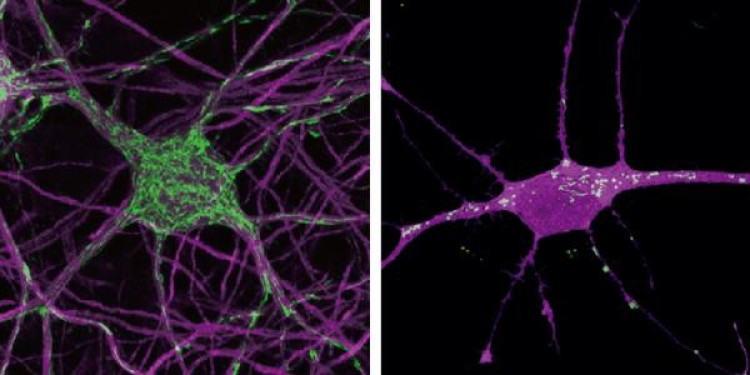It takes several years for the human brain to develop fully, whereas this happens much faster in other species. The slow maturation of the human brain is thought to be important for its function, but it was unknown what caused this. Now, a team of researchers led by Ryohei Iwata, Pierre Casimir, and Pierre Vanderhaeghen (VIB-KU Leuven Center for Brain & Disease Research and ULB) found that the mitochondria, the energy factory in the brain cells, are responsible for the rate at which the brain develops. This discovery sheds light on human evolution and may have important implications for brain function and diseases. Their work was published in Science.
Pierre Vanderhaeghen: “We discovered that mitochondria set the tempo of neuronal maturation. Neurons have an hourglass inside to measure time, and mitochondria provide that hourglass. This revelation is an important step to understand one of the greatest mysteries in biology: what makes the human brain so distinct from other species, and why is it so sensitive to some diseases? Our findings can also be used to speed up basic and pharmaceutical research into human neurological or psychiatric diseases, which up until now was greatly hindered by slow human neuronal development.”
Driven by mitochondria
The human brain takes a long time to develop its neurons compared to other species. It takes years to reach full maturity, instead of weeks in the mouse. This slow growth is also thought to be crucial for the enhanced functions of the human brain. Previous studies from the Vanderhaeghen Lab showed that this timing is controlled by cells themselves and not external factors, but it was unknown how.
Mitochondria are responsible for energy production in cells. Our brain lives off the energy that the mitochondria in the brain cells produce. Now, Vanderhaeghen and his lab showed that mitochondria also determine the development rate of the brain. This knowledge can have a significant impact on the study of neurological diseases.
The cellular hourglass
Mitochondria are the master regulators of the metabolism in every cell by converting nutrients like sugar into cellular energy. They were thought to be the same in every cell, but Ryohei Iwata and Pierre Casimir made the surprising observation that mitochondria in young human neurons behave differently from those of mouse neurons at the same age: the human mitochondria grow much more slowly, and their energy metabolism is much less active.

Mouse neurons (left) and a human neuron (right). Mitochondria displayed in green.
Could this be related to the slow speed of human neuron maturation? To test this, they pharmacologically and genetically manipulated the neurons to enhance mitochondrial function. They saw that this accelerated the pace of neuron development, so neurons became more mature months ahead. Conversely, decreasing mitochondrial function led to slower growth in the mouse neurons. This confirmed their suspicion that mitochondria set the tempo of neuronal maturation.
Ryohei Iwata, postdoctoral researcher and first author of the study: “We made this discovery because we developed a new genetic tool to measure time in developing neurons. We also invented a new method to obtain more mature neurons months ahead, which will be highly valuable for medical and pharmaceutical research.”
Implications for brain diseases
Indeed, when studying neuronal diseases in vitro, the slow development of neurons often hampers research. Mimicking the slow pace of maturation observed in vivo, growing human neurons in the lab takes several months to years to reach maturity. This makes the cells particularly difficult to study experimentally. Now, scientists will be able to accelerate neuronal maturation, allowing them to better study the brain’s function and models of neural diseases.
This work also has potentially important implications for some brain diseases. Some diseases strike mitochondria, and the affected patients often show early brain symptoms, which could be related to the discovery reported here. Conversely, some disorders that affect human brain development could be linked to mitochondria. The Vanderhaeghen team will follow up on these critical questions in the future.

Pierre Vanderhaeghen (left) and Ryohei Iwata (right)
Publication
Mitochondria Metabolism Sets the Species-Specific Tempo of Neuronal Development. Iwata, et al. Science, 2023. DOI 10.1126/science.abn4705.
